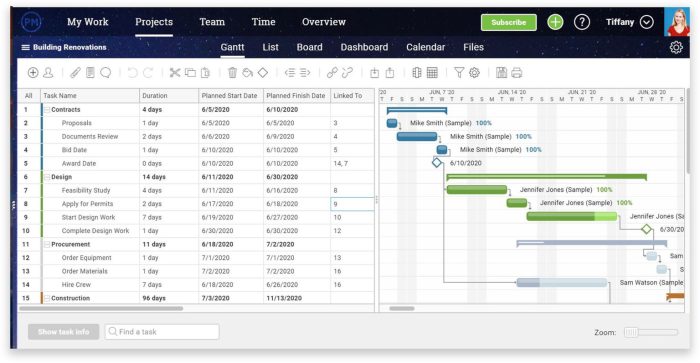Project scheduling software has revolutionized project management, transforming chaotic workflows into streamlined processes. From the humble Gantt chart to sophisticated AI-driven platforms, these tools offer a diverse range of functionalities, catering to projects of all scales and complexities. This exploration delves into the core features, benefits, and future trends of project scheduling software, examining its impact on team collaboration, productivity, and overall project success.
We will navigate the intricacies of implementation, integration, and the advanced features that empower project managers to navigate even the most challenging undertakings.
This analysis will cover various software types, comparing their strengths and weaknesses across different project management methodologies. We will examine how these tools enhance communication, facilitate resource allocation, and provide critical insights through robust reporting capabilities. The discussion will also consider the evolving landscape of project scheduling software, encompassing the integration of artificial intelligence and the ever-increasing importance of data security in this critical area of modern business.
Future Trends and Considerations
The tapestry of project management is woven with threads of efficiency, collaboration, and precision. As technology advances, the loom upon which this tapestry is created evolves, incorporating innovative threads of artificial intelligence, cloud computing, and enhanced security measures. The future of project scheduling software promises a richer, more resilient, and adaptable fabric, capable of withstanding the ever-shifting demands of the modern world.The integration of artificial intelligence (AI) and machine learning (ML) is poised to revolutionize project scheduling.
These technologies will not simply automate tasks; they will predict potential roadblocks, optimize resource allocation with unprecedented accuracy, and provide proactive insights into project health. This predictive capability allows for timely intervention, minimizing disruptions and maximizing efficiency. Imagine a system that anticipates supply chain delays based on historical data and current market trends, automatically adjusting schedules to mitigate potential impact.
This is the power of AI-driven project scheduling.
AI Integration and Predictive Analytics
AI-powered project scheduling software will move beyond reactive adjustments to proactive predictions. By analyzing vast datasets, including historical project data, market trends, and even weather patterns (for construction projects, for example), AI algorithms can forecast potential risks and opportunities.
This allows project managers to make informed decisions, allocate resources more effectively, and ultimately, deliver projects on time and within budget with a higher degree of certainty. For instance, a construction project might use AI to predict potential weather delays and adjust the schedule accordingly, preventing costly overruns.
Cloud-Based Solutions and Enhanced Collaboration, Project scheduling software
The cloud has become the cornerstone of modern software development, and project scheduling is no exception. Cloud-based solutions offer unparalleled accessibility, allowing teams dispersed across geographical locations to collaborate seamlessly. Real-time data synchronization ensures everyone is working with the most up-to-date information, eliminating the confusion and delays caused by outdated spreadsheets or isolated databases.
Furthermore, cloud platforms often offer enhanced security features and scalability, adapting to the ever-changing needs of growing projects and teams. A global marketing campaign, for example, could leverage a cloud-based project scheduling tool to manage its diverse team and track progress in real-time across multiple time zones.
Data Security and Privacy in Project Scheduling
The sensitive nature of project data necessitates robust security measures. As project scheduling software becomes more sophisticated and integrated, data breaches become a significant concern. Future development must prioritize end-to-end encryption, multi-factor authentication, and regular security audits. Compliance with data privacy regulations, such as GDPR and CCPA, will be paramount.
Software providers must be transparent about their data handling practices and invest in advanced security technologies to protect sensitive project information. Failure to do so could result in significant financial and reputational damage.
Evolution of the Software Landscape in the Next Five Years
In the next five years, we can expect a convergence of AI, cloud computing, and enhanced collaboration features. Project scheduling software will become more intuitive and user-friendly, with personalized dashboards and customizable workflows. Integration with other business applications, such as CRM and ERP systems, will become increasingly seamless.
We can also anticipate the rise of specialized project scheduling solutions tailored to specific industries, offering features and functionalities optimized for particular needs. For instance, the healthcare industry might see the emergence of software specifically designed for managing complex clinical trials, with features for regulatory compliance and patient data privacy.
Future Application in a Novel Industry or Context
The application of project scheduling software extends beyond traditional industries. Consider its potential in the burgeoning field of space exploration. Planning and executing complex missions to Mars, for instance, requires meticulous scheduling and resource management. Software capable of simulating various scenarios, predicting potential risks, and optimizing resource allocation will be crucial for the success of such ambitious endeavors.
This specialized software would need to account for the unique challenges of space travel, including communication delays, resource limitations, and the harsh conditions of space.
Final Review: Project Scheduling Software

In conclusion, project scheduling software stands as a cornerstone of effective project management in the modern era. Its ability to streamline workflows, enhance collaboration, and provide crucial data-driven insights has transformed how projects are planned, executed, and delivered. While challenges remain, particularly concerning integration and data security, the ongoing innovation in this field promises even more powerful tools and functionalities in the years to come.
The future of project management is inextricably linked to the continued development and refinement of these indispensable software solutions, shaping a more efficient and productive landscape for businesses worldwide.
